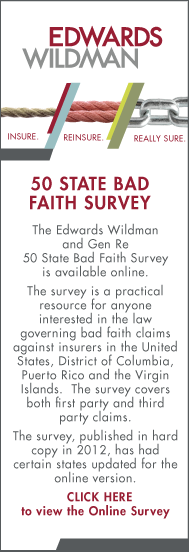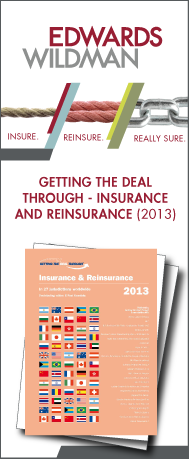 |
|||||||||||||||||||||||||||||||||||||||||
| edwardswildman.com | |||||||||||||||||||||||||||||||||||||||||
|
Commercial Court Considers Brokers' Duties, Limitation and Recoverability of Funds and Investment Return by Nathan Hull and Jane Elphick (London) In Equitas Limited v Walsham Brothers & Company Limited [2013] EWHC 3264 (Comm), the Commercial Court considered duties of reinsurance brokers to remit funds to their principals. In doing so, the Court drew some important conclusions in relation to the nature and scope of brokers’ duties, and to whom they are owed, and also in relation to the recoverability of compound interest and of investment return. BACKGROUND Lloyd’s syndicates suffered heavy losses in the 1980s and early 1990s arising from long-tail pollution and asbestos liabilities. This led to protracted litigation and turmoil in the Lloyd’s market. However, in 1996, a settlement agreement was entered into which aimed to put an end to this. Prior to the settlement, Lloyd’s had published a lengthy document entitled “Lloyd’s: Reconstruction and Renewal” setting out how it proposed to reconstruct the syndicates’ financial positions and deal with the problems of the past. That proposal included finality for the Names of syndicates facing continuing losses, which was to be achieved by the incorporation of Equitas. Equitas was to reinsure 100% of the syndicates’ liabilities in respect of non-life insurance for the 1992 and all prior years of account. In return, Equitas would be assigned all the rights, title and interest of those syndicates in relation to that business. The proposal also provided for Equitas to take a much longer term view of its investments than had been possible for the syndicates (operating a three-year accounting period, with short-term investment strategies). It was anticipated that Equitas would receive more than £7 billion in premium, which it would invest to meet claims to be made against the syndicates over the following 40 years, while running off the policies taken out during the 1992 and prior years of account. Consequently, Equitas would, it was hoped, achieve investment return significantly higher than had been possible for the individual syndicates. PROCEEDINGS In this case, Equitas claimed that the defendant broker, Walsham (one of the largest Lloyd’s reinsurance brokers during the 1980s and 1990s), had received substantial sums (claims on outwards policies and premiums on inwards policies) which should have remitted to the syndicates (or, after 1996, to it). As Walsham had not remitted the funds, Equitas had lost substantial investment income. Walsham’s defence was that, although it had this duty, any claim by Equitas was now time barred. CONTINUING DUTIES The Commercial Court considered the nature of brokers’ duties in relation to reinsurance policies. It noted that there was compelling evidence that the market understanding of the professional responsibilities undertaken by a Lloyd’s broker were to:
Regarding the duty to remit funds promptly, the Commercial Court found that this was an absolute, continuing duty, as Walsham’s role in collecting and remitting funds was central to the administration of the reinsurance policy, and was ongoing. The duty to remit funds was owed to the syndicates (on both inwards (in respect of premium) and outwards (in respect of claims) reinsurance policies) and after the assignment, to Equitas. Further, the Court found that this duty was owed by Walsham to Equitas directly as it knowingly acted as broker to Equitas after the assignment and therefore owed the same duties as it owed the syndicates. Further, Walsham agreed to “account to Equitas for funds received” in a Brokers’ Agreement of August 1996 and had accepted direct duties to Equitas in a letter of July 2002. LIMITATION The Commercial Court found that the continuing duty to remit funds was breached afresh each day funds were not remitted as they should have been by Walsham. Therefore, Equitas could recover damages regarding the breaches of duty in the six years prior to the commencement of proceedings. However, this did not extend to breaches committed any earlier than that unless Equitas could establish that it or the syndicates did not know of the facts relevant to a cause of action against Walsham (sections 14A and 14B of the Limitation Act 1980) or that there had been deliberate concealment by Walsham (section 32(1)(b) of the Limitation Act 1980). This would suspend the running of the limitation period. This issue was held over for a later hearing, if necessary. DAMAGES The Commercial Court noted that damages were in principle recoverable for breach of duty to remit funds, subject to remoteness and mitigation. The Court stated that ordinarily it would proceed on the basis that a claimant kept out of its money has suffered loss as a result; specific evidence was not required to prove this loss. The measure of loss should normally be calculated by the cost of borrowing in the market at the applicable time. The particular financial affairs of the claimant would not be relevant unless that party sought to recover at a rate of interest above the market rate at the time. The Court noted that compound interest was the only basis on which money could be borrowed commercially. Subject to limitation (see above), the Court awarded interest for the period up to the assignment (1996) at a rate of LIBOR plus 1% with appropriate rests (to be determined in the absence of agreement but which the Court suggested should be quarterly in line with the practice in London arbitration). As regards the period after the assignment, the Commercial Court noted that Walsham owed a duty to remit funds to Equitas directly. Therefore, Equitas’s claim for investment return was not confined to that of an assignee. As Walsham did not raise any issue of remoteness or mitigation if it was held that it did owe a duty to Equitas directly, the Court found that, subject to limitation, Equitas was entitled to recover at the rate of return achieved on its investment funds during the period after the assignment. Even if Walsham had argued remoteness, the Court indicated that it would have found against Walsham given the nature of the Reconstruction and Renewal proposed by Lloyd’s and the investment returns that it was envisaged Equitas would make as part of that proposal. Notwithstanding today’s low-interest environment, the principles endorsed in relation to compound interest, rest periods and, in particular, investment return are of financial significance in cases involving long-standing contractual obligations of this nature. Contact
| ||||||||||||||||||||||||||||||||||||||||
 |
|||||||||||||||||||||||||||||||||||||||||



